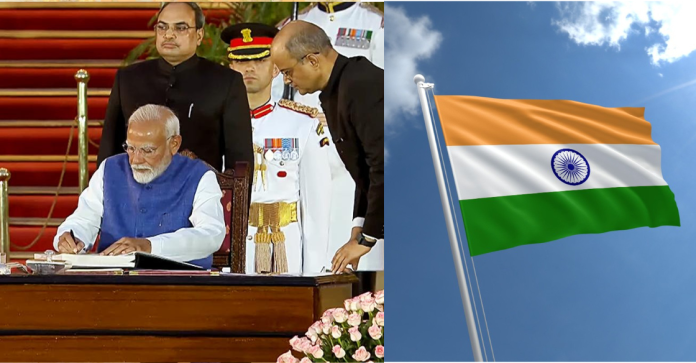In a historic moment for Indian politics, Prime Minister Narendra Modi was sworn in for his third consecutive term at a grand ceremony held in New Delhi on June 10, 2024. The event, marked by pomp and grandeur, took place at the iconic Rashtrapati Bhavan, the official residence of the President of India. The ceremony was attended by a host of dignitaries, including international leaders, top officials, and prominent personalities from various fields.
The Ceremony
The oath-taking ceremony commenced at 6 PM IST, with President Droupadi Murmu administering the oath of office and secrecy to Modi. The event was broadcast live across the nation, drawing millions of viewers. The lush gardens of Rashtrapati Bhavan were transformed into a spectacle of Indian culture and heritage, adorned with vibrant flowers and elaborate decorations.
As Modi took the oath, a sense of anticipation and celebration filled the air. The ceremony was attended by several high-profile guests, including leaders from SAARC countries, representatives from major global powers, business tycoons, and celebrities from the entertainment industry. Notable attendees included the President of the United States, the Prime Minister of Japan, and the Chancellor of Germany, underscoring the significance of India’s position on the global stage.

Modi’s Address
In his inaugural address, Modi expressed gratitude to the citizens of India for their continued trust and support. He emphasized his commitment to furthering India’s development agenda, focusing on economic growth, technological advancements, and social welfare. Modi reiterated his vision of transforming India into a global superpower and highlighted the importance of unity and collective effort in achieving national goals.
“Today marks a new chapter in our journey. Together, we will build an India that is strong, prosperous, and inclusive. Our mission is to empower every citizen and ensure that the benefits of development reach every corner of the nation,” Modi declared to resounding applause.
Policy Priorities
As Modi embarks on his third term, several key policy areas are expected to be at the forefront of his administration’s agenda:
- Economic Growth: Revitalizing the economy through significant reforms, attracting foreign investment, and boosting domestic manufacturing.
- Digital India: Accelerating the digital transformation to enhance governance, improve public services, and create a robust digital infrastructure.
- Social Welfare: Strengthening social safety nets, expanding healthcare access, and ensuring quality education for all.
- Infrastructure Development: Launching mega infrastructure projects, including highways, railways, and urban development initiatives.
- Environmental Sustainability: Focusing on sustainable development, promoting clean energy, and addressing climate change.
Reactions and Expectations
Reactions to Modi’s third term have been mixed, with supporters lauding his vision and leadership, while critics express concerns over various policy decisions and governance issues. Nevertheless, the overwhelming mandate he received in the recent elections reflects a strong endorsement of his leadership by the electorate.
International leaders congratulated Modi on his re-election, expressing optimism about strengthening bilateral relations and collaboration on global challenges. The U.S. President noted, “India’s success is vital for global stability and prosperity. We look forward to working closely with Prime Minister Modi in the years ahead.”
Conclusion
Narendra Modi’s swearing-in for a third term as Prime Minister of India marks a significant moment in the country’s political history. The grand ceremony in Delhi not only celebrated his leadership but also set the stage for the next phase of India’s journey towards development and global prominence. As Modi takes on the mantle once again, the nation and the world keenly watch how his vision and policies will shape the future of India.


